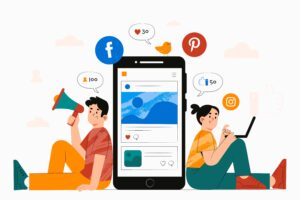Digital Marketing vs. Traditional Marketing: What’s the Difference?
Marketing plays a crucial role in the success of any business. However, with the rise of digital technology, marketing strategies have evolved significantly. While traditional marketing still holds value, digital marketing has transformed the way businesses connect with their audiences.The core difference lies in the channels used: traditional marketing relies on offline methods like print and broadcast media, while digital marketing leverages online platforms like websites, social media, and email. Marketing strategies can be broadly categorized into **digital (online) marketing** and **traditional (offline) marketing**. Here’s how they differ:
1. Definition-
Traditional marketing encompasses offline advertising and promotional activities, such as print ads, TV commercials, radio ads, billboards, and direct mail. Digital Marketing involves promoting products or services using digital channels like social media, websites, email, and search engines.
2. Channels Used-
Traditional Marketing Channels: Television commercials Radio ads Newspapers and magazines Billboards and posters Flyers and brochures Direct mail (postcards, catalogs) Telemarketing Events & trade shows
Digital Marketing Channels:
Social media (Facebook, Instagram, LinkedIn, etc.) Search engine optimization (SEO) Pay-per-click (PPC) ads Email marketing Content marketing (blogs, videos, etc.) Influencer marketing
3.Cost-
Traditional Marketing: Expensive due to printing, production, and broadcasting costs.
Digital Marketing: More affordable, with options like social media ads and email marketing providing high ROI.
4. Audience Targeting-
Traditional Marketing: Broad audience targeting (e.g., TV ads reach everyone watching).
Digital Marketing:Uses data analytics and AI to target specific audiences based on interests, demographics, and behavior.
5. Measurability & Analytics-
Traditional Marketing: Harder to measure (e.g., estimating billboard views).Difficult to track ROI. Results are based on assumptions and market surveys.
Digital Marketing: Provides real-time analytics and performance tracking (e.g., Google Analytics, Facebook Insights).
6.Engagement and Interaction-
Traditional Marketing:Traditional marketing tends to be a one-way communication, with limited opportunities for audience engagement.
Digital Marketing: Two-way communication that allows businesses to interact with customers in real time (comments, messages, etc.).
7. Speed and Flexibility-
Traditional Marketing:Requires time for planning, production, and distribution. Slow to modify (printing, broadcasting delays).
Digital Marketing: Quick implementation and easy adjustments based on performance.Instant updates (change ads in minutes).
8. Reach & Global vs. Local-
Traditional Marketing: Often limited to local or regional audiences.
Digital Marketing: Global reach (anyone with internet access).

